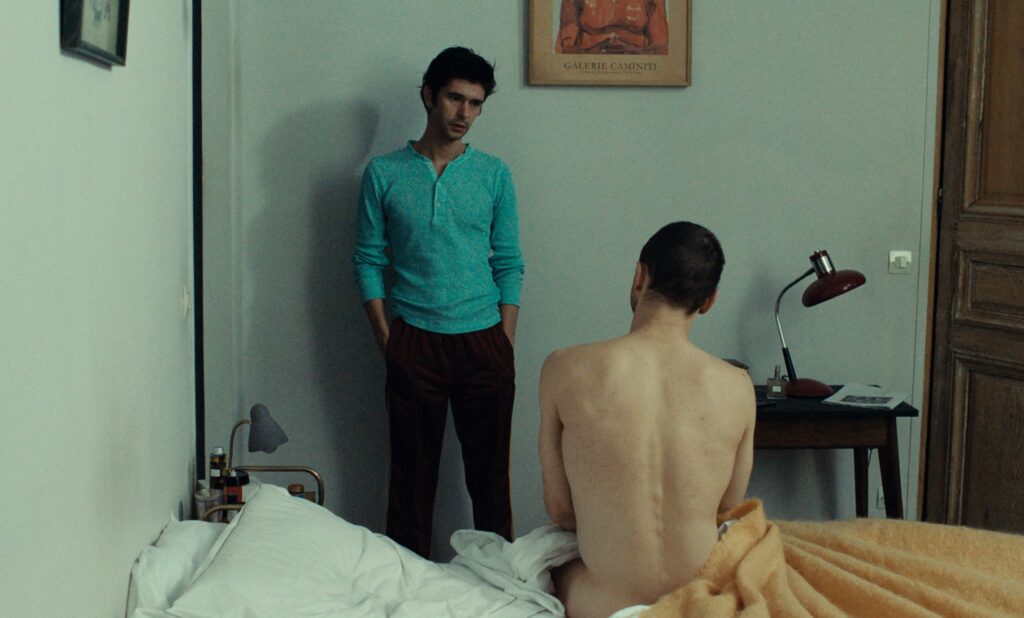That Tomas (Franz Rogowski, Transit), a German film director living in Paris, can be a monster is established early in Ira Sachs’ (Keep the Lights On, Love Is Strange) latest drama Passages as he berates an actor on a film set. Later, at his wrap party he meets Agathe (Adèle Exarchopoulos Blue is the Warmest Color) and sleeps with her, a story he proudly relates to his English husband Martin (Ben Whishaw, Women Talking, the voice of Paddington bear). Tomas’ self-absorption and arrogance act as kind of a human wrecking ball, smashing into everyone around him—including himself.
“Tomas comes from me and people I know,” Sachs says during a recent Zoom call. “He has a bottomless need for things he cannot have and things that are just out of reach, which I think is connected—for many of us—to our ambition as well as some form of self-loathing.
“Though I’m not sure Tomas loathes himself. I think Tomas loves himself.”
Relationships have been Sachs’ stock in trade throughout his career, and his semi-autobiographical 2012 feature Keep the Lights on similarly focused on a filmmaker and his romantic and erotic life. In making another film about a director, he initially thought the script that he penned with his longtime writing partner Mauricio Zacharias was an exploration of identity as Tomas navigates an affair with a woman. Instead, the drama is an observation of sexual fluidity.
“What’s interesting to me is the difference between the film I imagined and the one we made,” Sachs says. “With these actors, who are a generation younger than me, identity wasn’t on the table. The film erases those kinds of categorizations.
“They’re each risk takers,” he adds of his cast. “I ended up casting the three of them because they have similarities but also great differences. Franz is like an animal. Ben is a knife—there is vulnerability but also enormous strength, in terms of spine and in terms of craft and talent. Adele is a goddess. They each have different ways of creating mystery and precision.”
The actors also had to be willing to make themselves vulnerable. Certainly, the sex scenes are both intimate and frank. But it is not just physical nudity on screen but also emotional nakedness as the three characters negotiate a rocky terrain. Sachs does not rehearse actors before he begins to shoot, so Rogowski, Exarchopoulos, and Whishaw were almost like circus performers working without a safety net.
“Every day there’s the possibility of something extraordinary happening, and also great failure,” Sachs says. “For the actors to take that risk on a daily basis, they have to trust me, they have to believe that I love them.”
Sachs’ last film, 2019’s Frankie, was shot in Portugal. For the kind of personal films he makes, Sachs finds he has more support in Europe. He also has a deep connection to France. In 1986, as a 20-year-old, he moved to Paris for a time. He lost himself in the movies, seeing 197 films in three months’ time. The trip introduced him to the works of Francois Truffaut, Vincent Minnelli, and John Cassavetes, among others. Three filmmakers who would have an enormous influence on Sachs—Chantal Akerman, Maurice Pialat, and Jean Eustache—were part of his film education during that period.
“I have a relationship to European and specifically French cinema, which makes me feel very comfortable there and interested in engaging in that history.”

But it is not just challenging for Sachs to make movies within the United States: Passages has made it clear to him that exhibiting them can also be an issue. The film is going out to theaters unrated. The alternative was the scarlet letter of “NC-17” bestowed on it by the MPAA. Sex is the rating board’s third rail, gay sex even more so, Sachs believes. The rating enrages him.
“It’s a warning shot to other filmmakers that if they create certain images, they will be punished,” he says. “It’s censorship in an active and institutionalized form.
“It’s no different than removing a book from a library in Texas. It’s exactly the same thing. We consider Hollywood this kind of liberal mecca but there’s censorship involved, including the economic censorship of what’s funded and what’s not—the MPAA represents a larger cross to bear.”
The censoring board that makes up the MPAA only totes up sex acts and nudity, leaving no room for meaning of context. The irony is, of course, had Tomas simply shot Agathe and Martin, bludgeoned them, or hacked them to pieces, the film probably would have sailed away with an R rating. Instead, there are only emotional wounds as Tomas careens between his lovers.
“I think of this film as like an action film in which each character is kind of knocking against the other in a way that could lead to sex or it could lead to destruction,” Sach says. “I think they’re really knocking, these three, and there’s a lot of bruising.”
PASSAGES opens Fri/11 at Alamo Drafthouse, Landmark Opera Plaza, and AMC Kabuki






